IAN HERBERT: Is it beyond ALL City fans to show respect to Sir Bobby Charlton? The man helped put Manchester on the map!
Perhaps inevitably, Manchester City are barely represented in the sea of flowers that currently front Old Trafford.
Liverpool, Everton and Burnley shirts have been placed there in tribute to Sir Bobby Charlton. West Ham, Cardiff and Barnsley are also represented.
But there’s almost nothing to add to the feeling that this week transcends the old blue/red divides and that United’s loss is Manchester’s loss.
That’s what accumulated bitterness can do, and City have certainly been on the receiving end of some from Manchester United in recent years.
A few of the staff were unlucky enough to cross paths with Sir Alex Ferguson behind the scenes when the teams met, during the early stages of the club’s journey from starter to dominant Manchester force.
Manchester should unite in tribute to Sir Bobby Charlton, who died this weekend
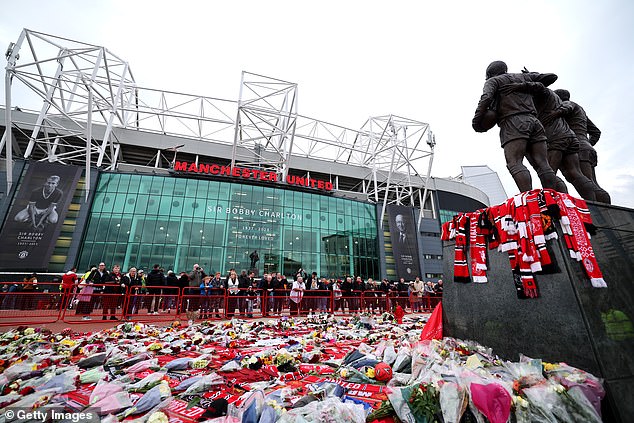
Tributes to Charlton from clubs across the country have been paid outside Old Trafford
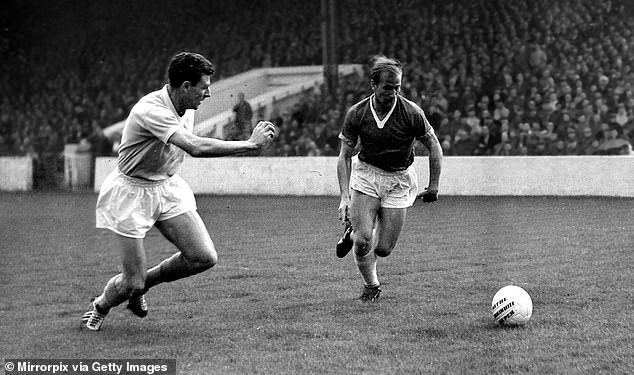
Charlton in action against Manchester City in his heyday, he helped make the city what it is
Ferguson strongly disliked City in the early Abu Dhabi era, and he let them know about it. But is it too much to ask of City fans when the teams meet on Sunday, a positive show of respect in memory of Sir Bobby?
And at the very least, that a minority of supporters should not be allowed to pollute the occasion with the kind of vile chants about Sir Bobby’s death that rang out around the Etihad at half-time during last weekend’s win over Brighton?
That’s the stadium that was built for the 2002 Commonwealth Games and that Sir Bobby helped secure for Manchester. The stadium that was crucial to Abu Dhabi’s decision to buy City, when Newcastle United and Everton were also contenders.
The chants that were so disgusting last Saturday would have been mind-boggling to those of the Charlton generation who did not know or understand this kind of attention-seeking and pumped-up hatred.
The City and United players of that era knew each other and shared each other’s lives at a time when the football world was a smaller, less violent place.
Sir Bobby always had great regard for City’s Colin Bell – a product of the football grounds of the North East, just like him. Bell, who died two years ago, told how he ran to catch up with Sir Bobby, after seeing him from a distance at a golf club where they had both arrived to play an organized event.
Charlton quickened his pace, as if taking cover from another random stranger, until, looking over his shoulder, he recognized Bell and a wide smile appeared on his face.
“Hello, Colin boy!” He said, before the two started a long and easy conversation.
“He’s invited me to Old Trafford a million times,” Bell said.
The ties between these clubs extend much further. They return to City and offer financial help to United in the early 1930s when they were struggling. To Maine Road, which was United’s home ground for three and a half years after the Second World War, after Old Trafford was bombed.
The mutual dislike belongs only to more recent times, because for Sir Bobby and his relatives humanity and rivalry can coexist.
George Best’s friendship with City’s Mike Summerbee came about simply because one day they went to the same coffee shop in Manchester – Kardomah in St Ann’s Square – and discovered they got on. They eventually ran a fashion boutique, Edwardia Together in Manchester.
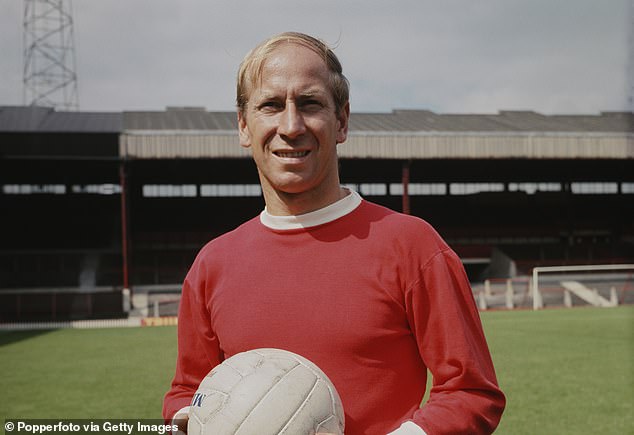
Sir Bobby’s contribution to the city of Manchester far exceeded his achievements on the field
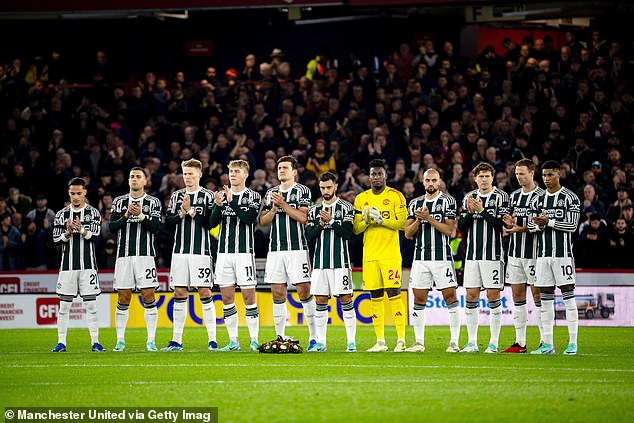
Manchester United will pay tribute to Charlton again on Sunday when they play Man City
One of the most telling moments in the Charlton documentary released by the BBC in recent days is Gary Neville’s story of how, after snapping at an opponent during a match, he was then quietly approached by Sir Bobby. ‘You don’t have to behave like that. You are a Manchester United player,” he told him, or words to that effect.
Sir Bobby’s contribution to life in his adopted city extends far beyond the goals and trophies.
Monday’s BBC North West Tonight news bulletin featured wonderful images commemorating his many years of work for the Children’s Adventure Farm Trust, a gem of an organization in rural Cheshire that provides free programs for terminally ill, disabled and disadvantaged children from across the North West -England.
Sir Bobby didn’t like to shout about his role. He didn’t want a fuss. It is a shame that a minute’s applause, rather than a proper, respectful, silent pause for remembrance and reflection, has been chosen as a way to commemorate him and his life before Sunday’s Old Trafford derby.
Despite United’s claims to the contrary, no one dares risk silence for the platform it provides these idiots. A minute’s silence for both Sir Bobby and the late, great Francis Lee, who died two weeks ago, could have been an answer.
But the occasion could still suit the man well on Sunday, as Pep Guardiola pointed out a few days ago. “Sir Bobby represented United and English football like no other,” he said in an impressive tribute.
‘When we go to Old Trafford we will be there, to pay tribute.’
John Stones was articulate and mature as he represented City on Saturday when discussing the loss of Sir Bobby. Not easy for a 29-year-old from a completely different generation.
If the intellectually challenged few try again with their poisonous chants, it is hoped that the elders in that crowd – the fathers, uncles, mothers and elderly companions – will silence them in no uncertain terms.
It would also be a moment – a gesture that will resonate through the years – if some of the blue contingent at Old Trafford this weekend can find the words and the song to ‘pay tribute’ – raising their voices and bringing others with them , in a final act of appreciation for a man who helped pave a path for Manchester and make it the city that it is.
Let’s hope Gerrard’s tragic departure to Saudi Arabia was worth the money
Steven Gerrard’s Al-Ettifaq lost 1-0 to Al-Riyadh on Saturday, in front of 696 fans, on a day when 3,195 watched Bury v Wythenshawe Town in the ninth tier of English football, 2,122 fans saw Hereford play Curzon Ashton, 1,124 were at Marine’s win against Lancaster and even Clitheroe conceded 702 for a 2-1 win over Newcastle Town.
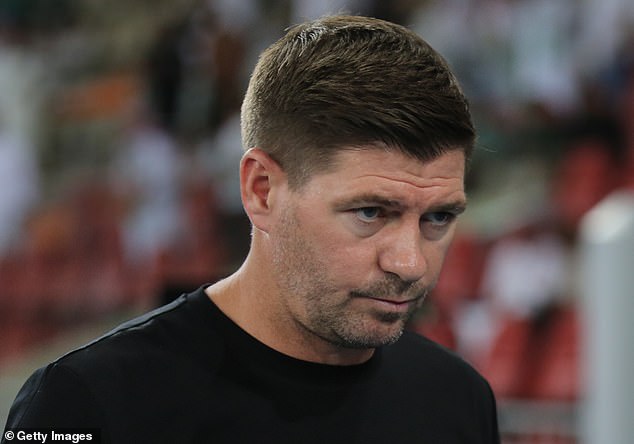
Steven Gerrard watched his Al-Ettifaq team play in front of just 696 fans in the defeat to Al-Riyadh
Gerrard’s departure to the wilderness of a club with little support, now seventh in the Saudi league, just as when he arrived, always seemed like a tragedy unfolding in plain sight. I just hope it’s worth the money.
Gates has moved mountains in the fight against dementia
The death this week of Bill Gates, a fearless center back for Middlesbrough, was overshadowed by the loss of Sir Bobby Charlton, but he was also a giant in so many ways: battling dementia while helping to support a campaign for players suffering from who suffer from illness. , many of his own generation.
Gates’ wife, Judith, has led that campaign with formidable intelligence and a keen awareness of the loneliness and struggle that awaits the families of those affected – many of whom she has helped.
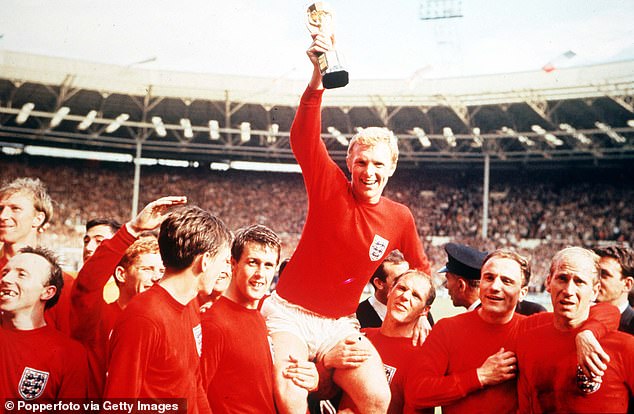
A number of England’s 1966 World Cup-winning heroes suffer from dementia
The Head for Change campaign group that Dr. Gates founded has moved mountains in a way that has put the game to shame. The country is in an ongoing battle for acceptance of the link between dementia and football, although the sheer power of numbers tells the story.
Sir Bobby, the late Nobby Stiles and Denis Law were all diagnosed with the disease. So the 1966 England team included Ray Wilson, Martin Peters, Jack Charlton, Roger Hunt and George Cohen.
Visit headforchange.org.uk to learn more about the charitable foundation that supports former players affected by neurodegenerative diseases.
Is anyone from the West Indies worried about the World Cup flop?
For all the heroics in Afghanistan and the Netherlands, the West Indies’ absence from the Cricket World Cup is a tragedy, not least for those of us who remember Clive Lloyd, Alvin Kallicharan and Bernard Julien in the 1975 and 1979 grand finals.
No cricketing nation has seen other forms of the game so damaged by T20 – and the mismanagement of the West Indies Cricket Board has not helped. Defeats to the Netherlands, Zimbabwe and Scotland in a disastrous World Cup qualifying campaign have left the West Indies in third place. – Rate ODI nation, now.
The expanded World Cup should mean they’ll be back in 2027, but the Twitter account for West Indies Cricket, which is currently promoting the Caribbean one-day tournament, is telling the story. Nobody seems interested.
